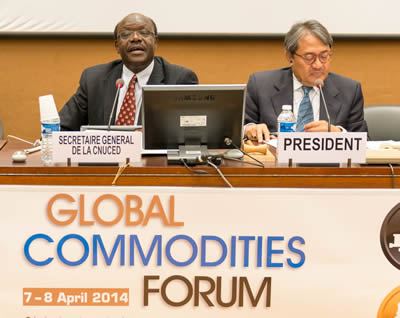Corrupt and opaque financial practices deprive resource-rich developing countries of “staggering” amounts of money, UNCTAD Secretary-General Mukhisa Kituyi said at the opening of the UNCTAD Global Commodities Forum in Geneva on 7 April.
“For example, the Africa Progress Panel recently estimated that trade mispricing deprived countries in sub-Saharan Africa of approximately US$38 billion per year, and that other illicit outflows deprived them of an additional US$25 billion,” Dr. Kituyi said. “These illicit outflows are greater than the total inflows of aid and foreign direct investment that these same countries receive on an annual basis.”
The sensitive issue of transparency, and the linked matter of global value chains in the commodities sector, was probed by experts from intergovernmental organizations, academia and the private sector at this year’s Global Commodities Forum.
Since its creation in 1964, UNCTAD’s aim, Dr. Kituyi said, “has been to identify solutions that transform the commodity sector from a poverty trap to an engine of growth.”
 From Left: Mr. Mukhisa Kituyi, (Secretary-General of UNCTAD), Mr. Triyono Wibowo (President of the Trade and Development Board of UNCTAD)
|
Acting Director-General of the United Nations Office at Geneva Mr. Michael Møller said that “consumers want to know where there goods are coming from, that they have been produced sustainably and without corruption, and that taxes have been paid.”
Mr. Møller placed the discussion into the context of the post-2015 development agenda, the goals of which are now being debated by a body of the United Nations General Assembly. “The global value chain and how to make it work better for developing countries has to be placed firmly at the centre of that debate,” he said.
Dr. Kituyi said that global value chains – which describe a sequence of activities undertaken to bring products to market that are coordinated by several firms across geographic regions – account for more than 60% of all international trade. Whereas in the past such chains were controlled by vertically integrated companies, Dr. Kituyi said, “advances in transportation and communication technologies have disaggregated supply chains globally.”
“This new, disaggregated framework shifts the types of opportunities available to commodity-dependent developing countries,” Dr. Kituyi added.
Ms. Arancha González, Executive Director of the International Trade Centre, said the international community has to “collectively change the mind-set that richness of natural resources and dependency on commodities is a curse”.
Citing ITC programmes in agricultural commodities sectors such as cotton, spices and fruit, Ms González said that private voluntary standards aimed at increasing transparency and improving governance were delivering measurable benefits to the small and medium-sized enterprises working in those sectors.
Mr. Addis Alem Balema, Director-General of the Commodity Exchange Authority of Ethiopia, said his country had tackled the resource curse head on and was now one of the fastest growing economies in Africa.
He said the Ethiopian Commodity Exchange that was set up in 2008 “has been transforming the agricultural market by relying on technology and knowhow tailored to the local context. [The Exchange] has brought efficiency integrity and transparency to the agricultural marketing system.”
The opening ceremony of the Forum was presided over by Mr. Triyono Wibowo, President of the Trade and Development Board of UNCTAD, who said that the Forum’s theme was topical at this time.
The two-day Global Commodities Forum, which took place 7-8 April, aimed to generate partnerships and innovative policy ideas for public, private and civil society leaders who specialize in commodity-based development.


